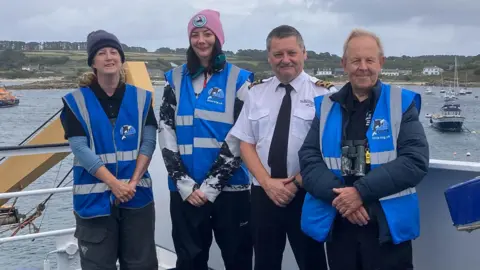Ferry route is UK's best for wildlife spotting
 Isles of Scilly Travel
Isles of Scilly TravelA ferry route between Penzance and St Mary's has been named the UK's best for wildlife spotting for the third consecutive year.
Isles of Scilly Travel said 347 animals, of seven different marine species, were recorded by marine conservation charity ORCA from ferry Scillonian III in 2024.
Lucy Babey, director of programmes for ORCA, said the sightings included common dolphin, Risso's dolphin, minke whale and sunfish.
Sharon Sandercock, communications manager for Isles of Scilly Travel, said: "It’s no wonder our passengers say the journey on Scillonian III is a big part of their island experience.”
Marine mammal surveyors conducted 15 surveys between March and November 2024 across a distance of 1,868km (1,160m), the ferry service said.
It said common dolphins were the species recorded most frequently, with 262 animals seen throughout the year and recorded on almost every survey.
The ferry service said sightings were lower overall in 2024 and there was a change in the distribution of animals along the route.
'Continued monitoring'
Risso’s dolphins remained high again this year, compared to the long-term pattern with 12 animals seen in 2024, it said.
"Research is mounting to suggest that warming oceans have altered the life cycles and distribution of some of their prey in the English Channel and Western Approaches, which could explain a change in occurrence," it added.
Ms Babey said the survey season highlighted the importance of "continued monitoring".
"With trends and shifts in cetacean distribution being reported on in real-time, the information collected during ORCA surveys is crucial for cetacean conservation," she said.
“We can’t wait to see what 2025 brings.”
Follow BBC Cornwall on X, Facebook and Instagram. Send your story ideas to [email protected].
